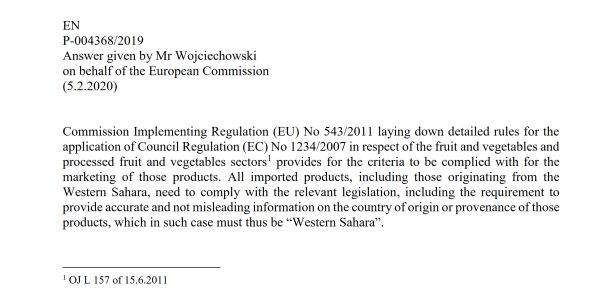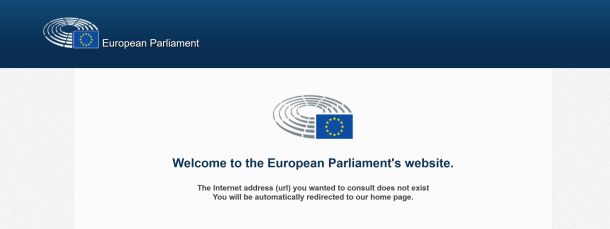
Two weeks ago, the EU Commission announced that products from Western Sahara should be labelled accordingly, only to withdraw that statement the very next day. Today, the Commission reaffirms its original position.
"All imported products, including those originating from the Western Sahara, need to comply with the relevant legislation, including the requirement to provide accurate and not misleading information on the country of origin or provenance of those products, which in such case must thus be “Western Sahara”.
That now appears to be the final and definitive answer of EU Commissioner for Agriculture Janusz Wojciechowski with regard to the labelling of products from the last colony in Africa. Find it published here.
The statement is identical to the one given two weeks ago, in response to a parliamentary question by MEP Heidi Hautala (Finland, Greens/EFA). But that written answer, as published on the website of the European Parliament, was withdrawn not even 24 hours later.
In response to that bizarre chain of events, MEP Hautala stated: "This is really unprecedented, particularly for an official reply to the Parliament from the highest level of the Commission. Apparently, a new, presumably “correct” response will be provided by the Commission in due course. I look forward to seeing how it will differ from the initial response."
Turns out that the "new" response, is in fact the same as the initial response.
"Congratulations are in order", says Sara Eyckmans from Western Sahara Resource Watch (WSRW). "It would appear that the Commission has discovered a newfound commitment to the correct labelling of origin of products from occupied Western Sahara. We sincerely hope that the Commission will continue on this path towards a more legally sound approach to Western Sahara: the Commission clearly acknowledges that the territory is not Morocco, so a next step would be to exclude it from its trade arrangement with Morocco."
In December 2016, the EU Court of Justice ruled that the EU-Morocco Trade Agreement could not be applied to Western Sahara, given that the territory is "distinct and separate" from Morocco. Western Sahara, the Court argued, is to be regarded as a third territory to the EU's trade relations with Morocco. As such, it can only be lawfully affected by those relations with the explicit consent of the people of the territory.
In order to appease Morocco - which froze its relations with the EU after the judgment - the EU quickly moved to negotiate an amendment to the existing trade deal to explicitely include Western Sahara with ... Morocco. The people of Western Sahara were not involved in any stages of the negotiation process. And in an attempt to create the illusion that consent had been obtained, the EU External Action Service proceeded to hold a consultation exercise in which only Moroccan entities participated, after the deal had already been initialed. Claims by the EEAS that the UN-recognised representation of the people of Western Sahara, the Polisario Front, had been consulted, were quickly proven to be a flat out lie. In fact, 83% of the groups - including WSRW - that the EU Commission claimed had participated in a 'consultation' regarding Western Sahara trade, had either never been asked to take part - or had not taken part - in any such process.
In spite of the clear opposition of the people of Western Sahara - expressed both through Polisario and through Saharawi civil society groups - to having the EU-Morocco trade deal apply to the part of their land that is under Moroccan occupation, the deal was approved by both the European Parliament and the EU Member States.
Polisario initiated legal proceedings against the amended trade deal with the EU Court of Justice (case T-279/19 Front Polisario v Council). A verdict is expected later this year.
EU Commission backtracks on labelling Western Sahara goods
What is EU's position on labelling of products from occupied Western Sahara? The EU Commission has now for the third time published a response to a parliamentary question on the matter, but the latest version fails to address the question.
Why does this EU statement keep disappearing?
A clarification by the EU Commission on labelling of products from Western Sahara was published, then removed, then published again and has now been removed again from EU websites.
Spectacular backtracking by EU Commission on Western Sahara labelling
On 5 February 2020, the EU Commission announced that products from Western Sahara should be labelled accordingly. But about 24 hours later, all traces to that statement had been removed from EU websites.
EU consumers, like Saharawis, ignored by EU lawmakers
The proposed trade scheme for occupied Western Sahara denies EU consumers the right to know the true origin of covered products, just like it failed the right of the people of Western Sahara to decide whether they wanted the deal in the first place.



